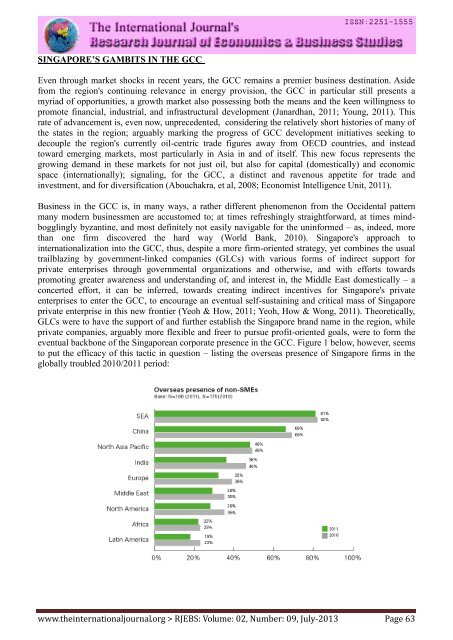Research Journal of Economics & Business Studies - RJEBS - The ...
Research Journal of Economics & Business Studies - RJEBS - The ...
Research Journal of Economics & Business Studies - RJEBS - The ...
You also want an ePaper? Increase the reach of your titles
YUMPU automatically turns print PDFs into web optimized ePapers that Google loves.
SINGAPORE’S GAMBITS IN THE GCC<br />
Even through market shocks in recent years, the GCC remains a premier business destination. Aside<br />
from the region's continuing relevance in energy provision, the GCC in particular still presents a<br />
myriad <strong>of</strong> opportunities, a growth market also possessing both the means and the keen willingness to<br />
promote financial, industrial, and infrastructural development (Janardhan, 2011; Young, 2011). This<br />
rate <strong>of</strong> advancement is, even now, unprecedented, considering the relatively short histories <strong>of</strong> many <strong>of</strong><br />
the states in the region; arguably marking the progress <strong>of</strong> GCC development initiatives seeking to<br />
decouple the region's currently oil-centric trade figures away from OECD countries, and instead<br />
toward emerging markets, most particularly in Asia in and <strong>of</strong> itself. This new focus represents the<br />
growing demand in these markets for not just oil, but also for capital (domestically) and economic<br />
space (internationally); signaling, for the GCC, a distinct and ravenous appetite for trade and<br />
investment, and for diversification (Abouchakra, et al, 2008; Economist Intelligence Unit, 2011).<br />
<strong>Business</strong> in the GCC is, in many ways, a rather different phenomenon from the Occidental pattern<br />
many modern businessmen are accustomed to; at times refreshingly straightforward, at times mindbogglingly<br />
byzantine, and most definitely not easily navigable for the uninformed – as, indeed, more<br />
than one firm discovered the hard way (World Bank, 2010). Singapore's approach to<br />
internationalization into the GCC, thus, despite a more firm-oriented strategy, yet combines the usual<br />
trailblazing by government-linked companies (GLCs) with various forms <strong>of</strong> indirect support for<br />
private enterprises through governmental organizations and otherwise, and with efforts towards<br />
promoting greater awareness and understanding <strong>of</strong>, and interest in, the Middle East domestically – a<br />
concerted effort, it can be inferred, towards creating indirect incentives for Singapore's private<br />
enterprises to enter the GCC, to encourage an eventual self-sustaining and critical mass <strong>of</strong> Singapore<br />
private enterprise in this new frontier (Yeoh & How, 2011; Yeoh, How & Wong, 2011). <strong>The</strong>oretically,<br />
GLCs were to have the support <strong>of</strong> and further establish the Singapore brand name in the region, while<br />
private companies, arguably more flexible and freer to pursue pr<strong>of</strong>it-oriented goals, were to form the<br />
eventual backbone <strong>of</strong> the Singaporean corporate presence in the GCC. Figure 1 below, however, seems<br />
to put the efficacy <strong>of</strong> this tactic in question – listing the overseas presence <strong>of</strong> Singapore firms in the<br />
globally troubled 2010/2011 period:<br />
www.theinternationaljournal.org > <strong>RJEBS</strong>: Volume: 02, Number: 09, July-2013 Page 63
















